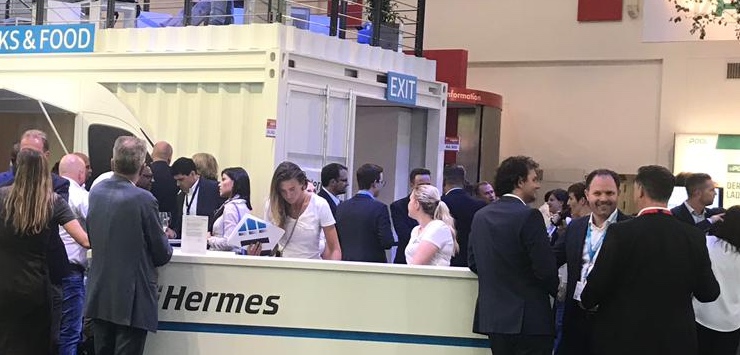transport logistic, the world’s leading transport and logistics trade fair, opened its doors from June 4th to June 7th 2019. More than 2100 exhibitors and over 60,000 visitors were lured to Munich, Germany – an all-time record. We spoke to Ralf Boelicke, Head of Department Solution Design at Hermes Germany, about the cooperation between retail partners in the supply chain, industry trends and e-mobility as the literal „drive of the future“.
Mr Boelicke, this year you were invited to speak at the LOGISTIK HEUTE Expert Forum on the topic “Cooperation in Logistics and SCM – Examples, Technologies, Potentials”. In this context you presented the results of the 9th Hermes Barometer on “Collaboration in the Supply Chain” – a survey on 200 German logistic experts. What feedback did you receive from the plenum? Do companies benefit from the advantages and synergies of closely collaborating with trading partners within the supply chain?
Indeed, companies are already benefitting in part from the pros and synergies that arise from collaboration with trading partners. However, this requires a successful business case with positive effects on all partners involved and this is not always the case. Many companies are only willing to invest in a cooperation if they have identified possible savings for themselves.
How do companies develop their cooperation in practice? What are potential obstacles that hinder a closer collaboration?
The obstacles identified in the Hermes Barometer (such as communication problems, lack of human and financial resources or security concerns) are also the main obstacles in practice. Further, companies often do not want to commit themselves and want to remain independent with regards to versatility. As a consequence, many companies develop individual solutions instead of relying on standardized options that are easier to use within the framework of a cooperation process.
Not least as a result of cross-border e-commerce, supply chains are becoming increasingly more international and complex. What kind of challenges are companies facing here?
Especially for small and medium-sized companies, cross-border e-commerce is a great opportunity to set up their business much more internationally and thus opening new sales markets. More and more companies are using this potential. A big challenge, however, is often the lack of knowledge of the respective markets. The Chinese market, for example, is very unique. Experienced logistic specialists know the traps.
Further, companies should not forget about the necessity of an integrated approach: Opening new sales markets naturally has an impact on the entire supply chain. Companies should strive for intelligent SCM optimization at an early stage in order to place the “internationalization” project on a solid foundation.
Which topics will be of particular importance in the future and what role will modern technologies play? What kind of developments do you expect?
Improving transparency and a good risk management are clearly two very important issues. At Hermes International, we use BigData to further increase process transparency and improve forecasting capabilities. In the future, we will be able to identify and solve disruptions and risks at an even earlier stage. This also became very clear in the panel discussion at the expert forum. Participants included the start-up company “Synfioo” which, for example, deals intensively with the sourcing and allocation of ETA data.
What other trends were presented at the trade fair?
The dominant topics at transport logistic were the use of artificial intelligence and the automation of logistical processes. Development in this field is progressing steadily. However, the gap between what is possible and what is currently used in practice is still quite wide. Changes like these require time and know-how. At Hermes Germany, for example, we started implementing Big Data at an early stage to automatically improve forecasting. Thus, we are now benefitting from the positive effects.
Mr. Boelicke, thank you for the interview.

